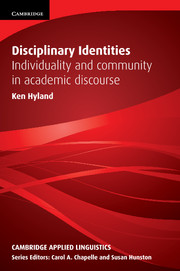Book contents
- Frontmatter
- Contents
- Series editors’ preface
- Preface
- Acknowledgements
- Notes on corpora and abbreviations
- 1 Identity: Interaction and community
- 2 Discipline: Proximity and positioning
- 3 Investigating identity
- 4 Identity in representational genres
- 5 Self-representation in academic bios
- 6 Culture: Authority and visibility
- 7 Reputation: Individuality and conformity
- 8 Gender: Disciplinarity and positioning
- 9 Identity, disciplinarity and methodology
- Appendix: Items with potential metadiscourse functions
- References
- Name Index
- Subject Index
9 - Identity, disciplinarity and methodology
Published online by Cambridge University Press: 09 February 2023
- Frontmatter
- Contents
- Series editors’ preface
- Preface
- Acknowledgements
- Notes on corpora and abbreviations
- 1 Identity: Interaction and community
- 2 Discipline: Proximity and positioning
- 3 Investigating identity
- 4 Identity in representational genres
- 5 Self-representation in academic bios
- 6 Culture: Authority and visibility
- 7 Reputation: Individuality and conformity
- 8 Gender: Disciplinarity and positioning
- 9 Identity, disciplinarity and methodology
- Appendix: Items with potential metadiscourse functions
- References
- Name Index
- Subject Index
Summary
At one point in Ian Rankin’s detective novel The Hanging Garden, a character observes that the problem with conclusions is that they are supposed to be conclusive. Unlike Inspector Rebus, however, who wraps up his cases by assembling pieces of evidence that lead inexorably to some truth, observers of academic discourse are left with loose ends and uncertainty. Any stretch of language allows a variety of plausible interpretations, and often its routinised nature means that users themselves may not always be aware of what they are doing with it. The analyses I’ve presented in this book have therefore involved trying to assemble coherence from bits of observable data, piecing together potentially polypragmatic and ambiguous tracts of text to see what they reveal about identity as academics and students go about their daily business in universities. My goal has been to show how identity can be made concrete through the exploration of the mundane and the everyday. Some analysts would no doubt do things differently and other observers draw different interpretations from mine, and so I can offer no conclusive conclusions in this final chapter.
I do, however, want to make a few observations to recap the main arguments and pull together some of the trailing threads. I will offer some reflections on three key themes of the book: the connection between writing and identity, the role of disciplinarity and a methodology for exploring each of these. Finally I will comment briefly on the practical value of this kind of work and some possible future directions.
Identity and academic writing
One thread is the idea that academic writing is not just about conveying an ideational ‘content’: it is also about the representation of self. That is, in arguing our ideas, recounting our achievements, struggling for a course grade, acknowledging our gratitude or applying for a prize, we are also relating to a community of readers and so both giving and ‘giving off’ information about ourselves. In short, every act of communication is an act of identity because identity is what the writer does in a text.
- Type
- Chapter
- Information
- Disciplinary IdentitiesIndividuality and Community in Academic Discourse, pp. 195 - 210Publisher: Cambridge University PressPrint publication year: 2012



